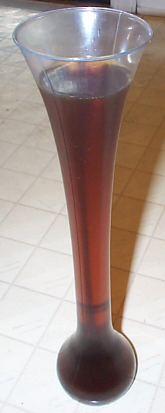
Bioliquids
Encyclopedia

Bioliquids are usually made from virgin or used vegetable and seed oils, like palm
Palm
Palm may refer to :* Palm, the central region of the front of the hand, see Hand#Human anatomy or metacarpus.-People:* August Palm , Swedish socialist activist* Conny Palm, , Swedish electrical engineer and statistician...
or soya
Soya
Soya can mean:* Soya bean* Sōya District, Hokkaidō* Sōya Subprefecture, Hokkaidō* Soya3D, a high-level three-dimensional rendering engine for the Python programming language* Soya sauce, a fermented sauce made from soybeans, roasted grain, water and salt....
oil. These oils are burned in a power station to create heat, which can then be used to warm homes or boil water to make steam. This steam can then be used to drive a turbine to generate electricity.
Rudolf Diesel
Rudolf Diesel
Rudolf Christian Karl Diesel was a German inventor and mechanical engineer, famous for the invention of the diesel engine.-Early life:Diesel was born in Paris, France in 1858 the second of three children of Theodor and Elise Diesel. His parents were Bavarian immigrants living in Paris. Theodor...
's first public exhibition of the internal combustion engine, that was to later bear his name, ran on peanut
Peanut
The peanut, or groundnut , is a species in the legume or "bean" family , so it is not a nut. The peanut was probably first cultivated in the valleys of Peru. It is an annual herbaceous plant growing tall...
oil.
Bioliquid production and use
Bioliquids have been used for many years to provide heat for homes on a small scale but now big energy providers are looking at their use on a larger scale.A controversial plant in Bristol
Bristol
Bristol is a city, unitary authority area and ceremonial county in South West England, with an estimated population of 433,100 for the unitary authority in 2009, and a surrounding Larger Urban Zone with an estimated 1,070,000 residents in 2007...
(UK) was recently given the go ahead despite receiving several hundred complaints. The plant will be built and operated by W4B and provide enough power for 25,000 homes.
Advantages
Bioliquids have several key advantages over other sources of renewable energy:- Bioliquids have a high energy density
- The technology is well established, having been used for many years
- Can be used on demand, reacting quickly to changes in demand for power
Disadvantages
Many of the same problems that affect biofuels also affect bioliquids and there are various social, economic, environmental and technical issues, which have been discussed in the popular media and scientific journals. These include: the effect of moderating oil prices, the "food vs fuelFood vs fuel
Food vs. fuel is the dilemma regarding the risk of diverting farmland or crops for biofuels production in detriment of the food supply on a global scale. The "food vs. fuel" or "food or fuel" debate is international in scope, with good and valid arguments on all sides of this issue...
" debate, poverty reduction
Poverty reduction
Poverty is the state of human beings who are poor. That is, they have little or no material means of surviving—little or no food, shelter, clothes, healthcare, education, and other physical means of living and improving one's life....
potential, carbon emissions levels, sustainable biofuel
Sustainable biofuel
Biofuels, in the form of liquid fuels derived from plant materials, are entering the market, driven by factors such as oil price spikes and the need for increased energy security...
production, deforestation
Deforestation
Deforestation is the removal of a forest or stand of trees where the land is thereafter converted to a nonforest use. Examples of deforestation include conversion of forestland to farms, ranches, or urban use....
and soil erosion, loss of biodiversity
Biodiversity
Biodiversity is the degree of variation of life forms within a given ecosystem, biome, or an entire planet. Biodiversity is a measure of the health of ecosystems. Biodiversity is in part a function of climate. In terrestrial habitats, tropical regions are typically rich whereas polar regions...
, impact on water resources
Water resources
Water resources are sources of water that are useful or potentially useful. Uses of water include agricultural, industrial, household, recreational and environmental activities. Virtually all of these human uses require fresh water....
, as well as energy balance and efficiency.
Bioliquids also have several key problems compared to other sources of renewable energy:
- Price of fuel is very variable, due to competitiveness of feedstock for other uses (e.g. soap)
- Supply chain is still very new
- Governments, such as the EU, remained undecided on bioliquids
See also
- Bioheat, a biofuel blended with heating oilHeating oilHeating oil, or oil heat, is a low viscosity, flammable liquid petroleum product used as a fuel for furnaces or boilers in buildings. Home heating oil is often abbreviated as HHO...
. - Life cycle assessmentLife cycle assessmentA life-cycle assessment is a technique to assess environmental impacts associated with all the stages of a product's life from-cradle-to-grave A life-cycle assessment (LCA, also known as life-cycle analysis, ecobalance, and cradle-to-grave analysis) is a technique to assess environmental impacts...
- List of vegetable oils section on oils used as biodiesel
- Low-carbon economyLow-carbon economyA Low-Carbon Economy or Low-Fossil-Fuel Economy is an economy that has a minimal output of greenhouse gas emissions into the environment biosphere, but specifically refers to the greenhouse gas carbon dioxide...
- Table of biofuel crop yieldsTable of biofuel crop yieldsThe following table shows the vegetable oil yields of common energy crops associated with biodiesel production.This is unrelated to ethanol production, which relies on starch, sugar and cellulose content instead of oil yields....
- Vegetable oil economyVegetable oil economyVegetable oil economy deals with the potential of vegetable oil to replace fossil fuels in the economy and how it compares to other potential replacements, including renewable electricity. Vegetable oils are the basis of biodiesel, which can be used like conventional diesel...
- Vegetable oil fuel

